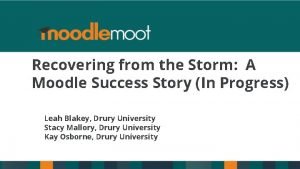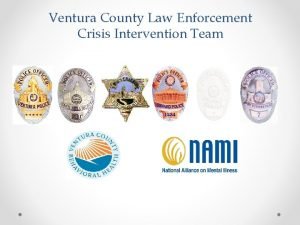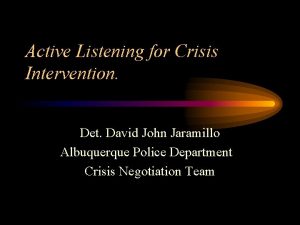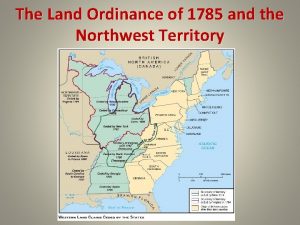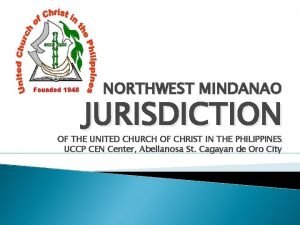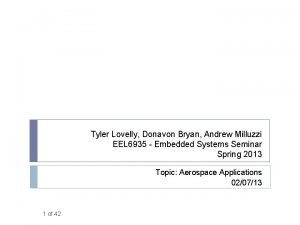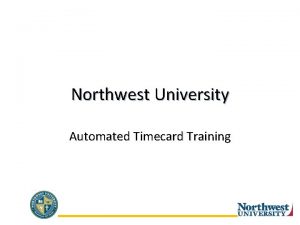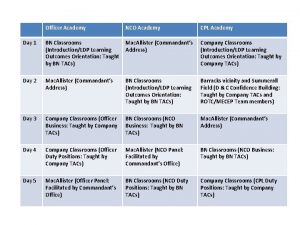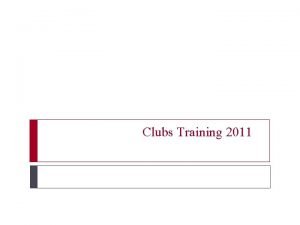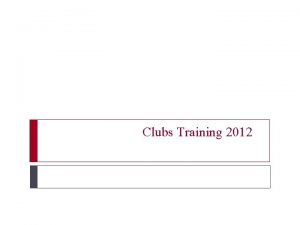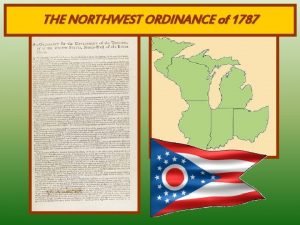Northwest Police Academy FOIA Training Mallory A Milluzzi


































- Slides: 34

Northwest Police Academy FOIA Training Mallory A. Milluzzi Elizabeth F. Brogan

Freedom of Information Act 5 ILCS 140, et seq.

Policy �Presumption in favor of openness with regard to public records. �All records in the custody or possession of a public body are presumed to be open to inspection or copying. �A public body that asserts that a record is exempt from disclosure has the burden of proving by clear and convincing evidence that it is exempt. 3

Requirements �FOIA requires inspection and copying of public records, except for those exempted by the Act. �It does not require staff to answer questions that are part of a document request or an oral request. �It does not require staff to create a new record to comply with a request. 4

Procedure �A request must be in writing. �A Public Body cannot require use of its standard form. �A Public Body cannot require the person making the request to specify the purpose for the request, except to determine whether the records requested are for a commercial purpose or whether to grant a fee waiver. �A Public Body may honor oral requests, but it is not required to. �All requests shall immediately be forwarded to its FOIA officer or designee. �A request can be delivered by any means. �Personal delivery, mail, telefax, or other. 5

Procedure � A Public Body must comply with or deny a request within five (5) business days. � Must also assert unduly burdensome or voluminous within the initial five (5) business days � Cannot charge for copies if fail to respond within requisite time periods � Extension of 5 additional business days in limited cases. � (i) the requested records are stored in whole or in part at other locations than the office � � � having charge of the requested records; (ii) the request requires the collection of a substantial number of specified records; (iii) the request is couched in categorical terms and requires an extensive search for the records responsive to it; (iv) the requested records have not been located in the course of routine search and additional efforts are being made to locate them; (v) the requested records require examination and evaluation by personnel having the necessary competence and discretion to determine if they are exempt from disclosure under Section 7 of this Act or should be revealed only with appropriate deletions; (vi) the request for records cannot be complied with by the public body within the time limits prescribed by paragraph (c) of this Section without unduly burdening or interfering with the operations of the public body; (vii) there is a need for consultation, which shall be conducted with all practicable speed, with another public body or among two or more components of a public body having a substantial interest in the determination or in the subject matter of the request. � Requester and public body can also agree to extend time for compliance in writing. 6

Procedure �Copying charges are limited: � The first 50 pages of black and white copies must be provided at no charge. � Remaining black and white copies = 15¢/page. � Color or non-letter/legal size = no more than actual cost. � Electronic records = actual cost of the recording medium, if applicable (ex: diskette, tape, etc. ). � Certifying a copy of a record = $1. 00. � May not charge for the costs of any search and review of the records or other personnel costs associated with reproducing the records (except for commercial requests). � Documents shall be furnished without charge or at a reduced charge, as determined by the public body, if the requester states the specific purpose for the request and indicates that a waiver or reduction of the fee is in the public interest. � The imposition of a fee inconsistent with statute constitutes a denial of access to public records for the purposes of judicial review. 7

Denial Procedure �When feasible, redact exempt information instead of denying. �Public Body must give written notice of denial stating the specific exemption claimed with detailed facts showing basis for the claimed exemption. �Notice to include names and positions of persons responsible for denial. �Notice to inform person of right to review by the PAC, provide the address and phone number of the Public Access Counselor, and advise of right to judicial review. �Failure to respond within the time permitted for extension shall be considered a denial of the request. 8

Commercial Purpose � “Commercial Purpose” - the use of any part of a public record in any form for sale, resale, or solicitation or advertisement for sales or services. � Requests made by the news media and non-profit agencies, as well as any scientific or academic organizations, are not commercial purposes when the principal purpose of the request is: �(1) To access and disseminate information concerning news and current or passing events; �(2) For articles of opinion or features of interest to the public; or �(3) For the purpose of academic, scientific, or public research or education. 9

Commercial Purpose � Within 21 working days after receiving a commercial request, the public body must do one of the following: �Provide the public records. �Deny the request due to exemptions. �Treat the request as unduly burdensome and extend an opportunity to the requester to attempt to reduce the request to manageable proportions. �Provide an estimate of the time required to provide the public records requested an estimate of the fees to be charged, which the public body can require to be paid before copying. � The first initial 8 hours spent by personnel searching and retrieving requested records or examining records for necessary redactions are still free of charge, but a Public Body may charge up to $10 per hour for each additional hour spent. � The actual cost of retrieving and transporting public records from an off 10 site storage facility can be charged to the commercial requestor.

Recurrent Requestors � Persons who have within the past 12 months submitted 50 requests or more, 15 requests within a 30 -day period, or 7 requests within a 7 day period from the same public body. � Excludes requests made by the news media and non-profit agencies, as well as any scientific or academic organizations, when the principal purpose of the request is (1) to access and disseminate information concerning news and current or passing events; (2) for articles of opinion or features of interest to the public; or (3) for the purpose of academic, scientific, or public research or education � One request may identify multiple records to be inspected or copied. � A Public Body must inform the requestor that it is being treated as a recurrent requestor within 5 business days (must inform that treating as recurrent requestor, reason why, and response within 21 days), but has twenty-one (21) business days to respond to the request. � Response shall: � (i) provide an estimate of the time required by the public body to provide the records requested an estimate of the fees to be charged, which the public body may require the person to pay in full before copying the requested documents, ; � (ii) deny the request pursuant to statutory exemptions; � (iii) notify the requester that the request is unduly burdensome and extend an opportunity to the requester to attempt to reduce the request to manageable proportions, ; or 11 � (iv) provide the records requested.

Voluminous Request � “Voluminous request” is a request that (1) includes more than 5 requests for more than 5 different categories of records or a combination of individual requests that total more than 5 different categories of records in a period of 20 business days; or (2) requires the compilation of more than 500 letter or legal-sized pages of public records unless a single requested record exceeds 500 pages. � Excludes requests made by the news media and non-profit agencies, as well as any scientific or academic organizations, when the principal purpose of the request is (1) to access and disseminate information concerning news and current or passing events; (2) for articles of opinion or features of interest to the public; or (3) for the purpose of academic, scientific, or public research or education. � A Public Body must inform the requestor that the request is being treated as a voluminous request within 5 business days, state the reasons why, and provide the requestor 10 business days to amend his or her request. If the request continues to be voluminous or the requestor fails to respond to the public body’s initial response, the public body shall respond to the voluminous request within 5 business days after (1) it receives the requestor’s response; or (2) the final day for the requestor to respond to the initial response. The public body can extend the time to respond by ten (10) business days

Procedure �The Public Body must provide document(s) in electronic format specified by the requestor, if feasible. �If it is not feasible to furnish in the specified electronic format, then the Public Body shall furnish it in the format in which it is maintained by the Public Body, or in paper format at the option of the requestor. �Fee may be waived or reduced if requestor states purpose and that it is in the public interest (health, safety and welfare or legal rights of general public, not personal or commercial benefit). 13

Public Records �“Public records" means all records, reports, forms, writings, letters, memoranda, books, papers, maps, photographs, microfilms, cards, tapes, recordings, electronic data processing records, electronic communications, recorded information and all other documentary materials pertaining to the transaction of public business, regardless of physical form or characteristics, having been prepared by or for, or having been or being used by, received by, in the possession of, or under the control of any public body. 14

Public Records �Only public records are subject to FOIA �Automatic public records: �Records of obligations, receipt and use of public funds; �Certified payroll under the Prevailing Wage Act with certain information to be redacted; �Arrest Reports; �Public Court Records; �Settlement Agreements. �Severance Agreement 15

Searching & Producing Records �Identify is the request is unduly burdensome or vague �You are not required to answer questions �You are not required to create a new document �Public bodies must conduct a reasonable search for records �A public body must use search terms that are reasonably calculated to locate all responsive records. �The issue to be resolved is not whethere might exist any other documents possibly responsive to the request, but rather whether the search for those documents was adequate. The adequacy of the

Unduly Burdensome � Requests calling for all records falling within a category shall be complied with unless compliance with the request would be unduly burdensome for the complying public body and there is no way to narrow the request and the burden on the public body outweighs the public interest in the information. � Before denying a request, must extend to the person making the request an opportunity to confer with it in an attempt to reduce the request to manageable proportions. �This includes a reasonable extension of time in some instances � Can deny a request based on the request being unduly burdensome, but such denial: �Must be after you have given someone the opportunity to narrow �Must be in writing and state that compliance would unduly burden its operation �Must specify the reasons why the request is unduly burdensome and the extent to which compliance would burden

Commonly Used Police Exceptions

Commonly Used Exemptions � Private information exemption 7(1)(b) � Personal privacy exemption 7(1)(c) � Preliminary draft/notes exemption. 7(1)(f) � Adjudication of employee grievances or discipline. 7(1)(n) � Test questions, scoring keys and other examination data used to determine qualifications of applicants. 7(1)(q) � Information exempt under Personnel Records Review Act. 7. 5(q) � Vulnerability assessments, security measures, and response policies or plans 7(1)(v) 19

Private Information � 2(c-5): "Private information" means unique identifiers, including a person's social security number, driver's license number, employee identification number, biometric identifiers, personal financial information, passwords or other access codes, medical records, home or personal telephone numbers, and personal email addresses. Private information also includes home address and personal license plates, except as otherwise provided by law or when compiled without possibility of attribution to any person. 20

Unwarranted Invasion of Personal Privacy � 7(1)(c) – Exempt if disclosure would constitute “a clearly unwarranted invasion of personal privacy, ” which means that disclosure of the information would be “highly personal or objectionable to a reasonable person and in which the subject’s right to privacy outweighs any legitimate public interest in obtaining the information. ” � Fact specific, case-by-case determination 21

Unwarranted Invasion of Personal Privacy �Examples of information that can be redacted �Victim’s name & other identifying information �Narratives of certain types of crimes such as domestic disputes, sexual crimes, etc. �Name of persons who are not arrested �Dates of birth �Autopsy photos �Can be released to the family or the estate �Names of persons who participate in line-ups �Not police officers as part of their public duties �Policy numbers 22

Unwarranted Invasion of Personal Privacy �Examples of information that cannot be redacted �Things that “bear on” public duties (resume and job application, employment contracts, timesheets, day off requests, administrative evaluations of employees, complaint letters) �VINs �Age & Gender �Name of treating hospital or medical facility

Law Enforcement Exemptions – 7(1)(d) � (i) interfere with pending or actually and reasonably contemplated law enforcement proceedings conducted by any law enforcement or correctional agency that is the recipient of the request; � (ii) interfere with active administrative enforcement proceedings conducted by the public body that is the recipient of the request; � (iii) create a substantial likelihood that a person will be deprived of a fair trial or an impartial hearing; � (iv) unavoidably disclose the identity of a confidential source, confidential information furnished only by the confidential source, or persons who file complaints with or provide information to administrative, investigative, law enforcement, or penal agencies; except that the identities of witnesses to traffic accidents, traffic accident reports, and rescue reports shall be provided by agencies of local government, except when disclosure would interfere with an active criminal investigation conducted by the agency that is the recipient of the request; � (v) disclose unique or specialized investigative techniques other than those generally used and known or disclose internal documents of correctional agencies related to detection, observation or investigation of incidents of crime or misconduct, and disclosure would result in demonstrable harm to the agency or public body that is the recipient of the request; � (vi) endanger the life or physical safety of law enforcement personnel or any other person; or 24 � (vii) obstruct an ongoing criminal investigation by the agency that is the recipient of

Commonly Used Police Exemptions �Section 7(1)(a) – Other laws �Expunged Records under Code of Criminal Procedure �School bus videos are exempt under the Illinois Criminal Code (720 ILCS 5/14 -3(m)) �The Federal Health Insurance Portability and Accountability Act of 1996 (HIPAA) �Custodial Interviews 25

Juvenile Records �Section 7. 5(bb): Information which is or was prohibited from disclosure by the Juvenile Court Act of 1987. �The Juvenile Court Act mandates that reports in which a minor was arrested, charged or investigated must be withheld in full. �Reports in which minors are the victims of sex crimes or are incidentally mentioned are not exempt in full, but the names of the minors may be redacted. Under the Juvenile Court Act, a public body is required to withhold information identifying an alleged minor victim of a sex crime �If a juvenile is a non-sex crime victim, rely on

Body Cameras � Section 7. 5(cc): exempts recordings made under the Law Enforcement Officer-Worn Body Camera Act except to the extent authorized under that Act � Times when body camera videos are subject to disclosure Any recording which is flagged due to the filing of a complaint, discharge of a firearm, use of force, arrest or detention, or resulting death or bodily harm except as set forth in #2 2. If a video is flagged due to #1 but the subject of the encounter is a victim or witness & has a reasonable expectation of privacy at the time of the recording & the police department obtains written permission of the subject or the subject’s legal representative 3. Disclosure to the subject or officer’s legal representative, subject to FOIA exemptions 1.

Body Cameras �Recordings made on officer-worn cameras must be retained for 90 days �After 90 days must be destroyed unless flagged �Flagged encounters are: �Complaints (formal & informal) �Discharge of firearm or use of force �Death or great bodily harm �Arrests – except traffic offense/business offense �Evidentiary value in criminal prosecution �Recording officer requests that the video be flagged

Information from LEADS or other shared Databases � 7(1)(b-5) Files, documents, and other data or databases maintained by one or more law enforcement agencies and specifically designed to provide information to one or more law enforcement agencies regarding the physical or mental status of one or more individual subjects. � 7(1)(d-5) A law enforcement record created for law enforcement purposes and contained in a shared electronic record management system if the law enforcement agency that is the recipient of the request did not create the record, did not participate in or have a role in any of the events which are the subject of the record, and only has access to the record through the shared electronic record

Inmate Exemptions �New exemptions that apply to FOIA requests from inmates �Explicitly states can deny records if the release of records: �Poses a harm to anyone �Contains information about a victim �Inmates cannot receive the criminal records of other persons – including arrest reports, mug shots, and crime scene photos �All include disclaimer “except as may be relevant to requestors current or potential case or claim” �Interpret this to be burden of requestor

Preliminary Records (7(1)(f)) �Preliminary drafts of memoranda, or preliminary communications before making an official decision �This is essentially the “deliberative process” privilege relied in courts �This exemption is waived if the document is publicly cited by the head of the public body (includes Police Chief) �This exemption only applies to intra-agency communications �Communications with parties representing independent interests are not considered “intraagency communications” 31

Adjudication of employee grievances and disciplinary cases �Section 7(1)(n) �This only relates to the formal adjudication of employee grievances or discipline �Would not apply to internal investigations �Law enforcement reports, traffic citations and documents that exist independent of any internal investigation would still be subject to disclosure, even if they are relied upon by a public body during the course of the investigation 32

7. 5(q) Personnel Records Review Act �Specifically exempts evaluations �Only records specifically exempt under FOIA �Personnel records are no longer per se exempt �Must determine if other exemption apply �Most likely 7(1)(b) or 7(1)(c) �Final discipline over four years old 33

Public Access Counselor � Created as a part of the Attorney General’s office. �Review and determine whether documents should have been disclosed under FOIA. �Review and determine whether a Public Body violated OMA. �May also issue advisory opinions to guide public bodies. 34
 Foia vs privacy act
Foia vs privacy act Masson trichrome 염색
Masson trichrome 염색 Mallory jeopardy
Mallory jeopardy Mallory body histology
Mallory body histology Corpusculi mallory
Corpusculi mallory Mallory lynch
Mallory lynch Moodle success stories
Moodle success stories Mallory johnston
Mallory johnston Jill mallory
Jill mallory Microscopio y sus partes
Microscopio y sus partes Mallory weiss tear
Mallory weiss tear Mallory martinez
Mallory martinez Esophagus
Esophagus Mallory bales
Mallory bales Police academy college point
Police academy college point Ventura county police academy
Ventura county police academy Police academy nes
Police academy nes Act 120 certification
Act 120 certification Patc police training
Patc police training Brb-60hwd1n1-m19
Brb-60hwd1n1-m19 Construction training essex
Construction training essex Engineering contractors
Engineering contractors Virtual labs
Virtual labs A plane flies northwest out of o'hare
A plane flies northwest out of o'hare Temperate rainforest plants
Temperate rainforest plants What is the significance of the northwest ordinance? *
What is the significance of the northwest ordinance? * Low power objective lens
Low power objective lens Land ordinance of 1785
Land ordinance of 1785 Serial killers pacific northwest
Serial killers pacific northwest Raven: a trickster tale from the pacific northwest
Raven: a trickster tale from the pacific northwest Northwest african countries
Northwest african countries Uccp vision mission goals
Uccp vision mission goals Nisdtx course guide
Nisdtx course guide Northwest isd ranking
Northwest isd ranking Navfac nw
Navfac nw






